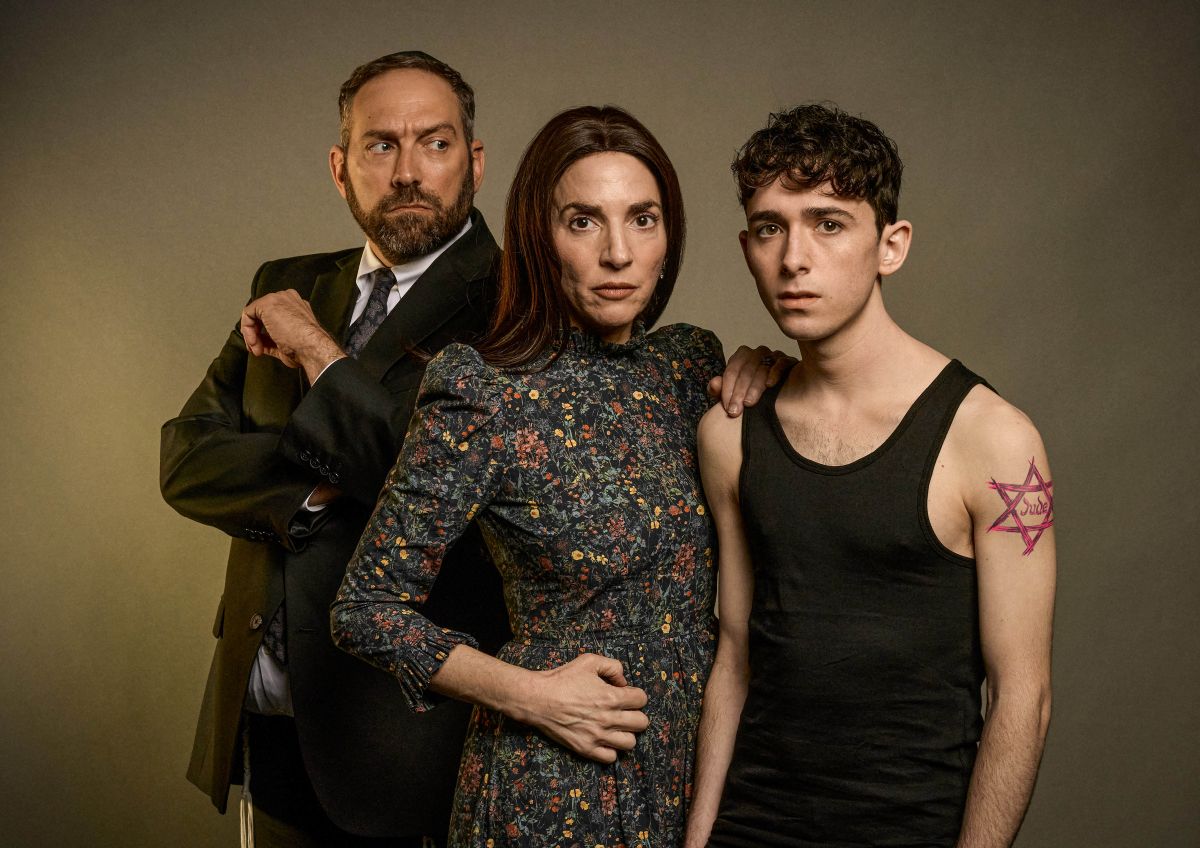Faygele, currently running at London’s Marylebone Theatre, feels less like a traditional play and more like a confessional. Written by Shimmy Braun while he was closeted, the work draws heavily from his own life. Raised in New York’s ultra-Orthodox Jewish community, Braun came out as gay at 40, a decision that lead to the collapse of his marriage, estrangement from his four children, and a period of deep depression. The result is a raw and deeply personal exploration of the emotional toll homophobia exacts within tightly knit religious communities.
At the centre of Faygele is Ari (Ilan Galkoff), who, we learn at the play’s outset, has died by suicide. Framed around his funeral, the narrative moves between the present and key flashbacks from Ari’s life. The first of these takes us to his Bar Mitzvah at age 13, where his father, Dr. Freed (Ben Caplan), publicly calls him “Faygele,” a Yiddish slur equivalent to “faggot.” These scenes act as emotional snapshots of Ari’s internal struggle, caught between his faith, his sexuality, and the growing distance from his family.
Although the play opens at a slow pace, and the titular slur lands with less force than one might expect, the production soon finds its rhythm, thanks in large part to Andrew Paul’s compelling performance as Rabbi Lev. His early warmth misleads us into thinking he might be an ally to Ari, which adds a layer of emotional complexity. At times, the play’s exploration of faith and identity feels a little blunt, particularly during Ari’s fourth wall-breaking monologues or when characters like Mrs. Freed (Clara Francis) and Dr. Freed express their views on Ari’s sexuality through direct exposition.
Galkoff’s portrayal of Ari is occasionally uneven. His heightened energy in scenes where he sees his own funeral sometimes clashes with the more grounded, vulnerable Ari we see in flashbacks, creating a tonal disconnect that feels jarring.
That said, the production finds its emotional core in the scenes that move beyond the funeral, particularly those focusing on Ari’s relationships with his family and friends. A standout moment is the climactic confrontation between Ari, Mrs. Freed, and Dr. Freed, which highlights the strength of both Francis and Caplan’s performances. Francis, especially, captures the quiet turmoil of a woman grappling with her own identity and grief.
The exchanges between Rabbi Lev and Sammy offer moments of levity and contrast, revealing a deeper tension between religious duty and emotional distance. Sammy, a secular outsider, steps away, leaving Ari to navigate his pain alone.
It is in these tensions, between tradition and individuality, between family obligation and personal truth, that Shimmy Braun’s writing is at its most resonant. Unsurprisingly, this is where the play feels most rooted in lived experience.
The staging stays minimal, keeping the focus firmly on the actors. A framed photo of Ari stays on stage throughout, while simple shifts in chairs and desks mark transitions between locations such as a kitchen, a funeral hall, and a therapist’s office.
Faygele may seem like a simple story about a young boy growing up gay in an ultra-Orthodox community. But look closer, and it reveals something deeper, a meditation on human connection and the painful complexities of family. Its power lies in the moments drawn most directly from Braun’s own life, and it is in those moments the play truly lands.
By Shimmy Braun
Director
Marylebone Theatre.
Cast: Ilan Galkoff; Ben Caplan; Clara Francis; Andrew Paul; Yiftach Mizrahi
Until 31 May
90 minutes (no interval)
Photos credit: Michael Wharley

